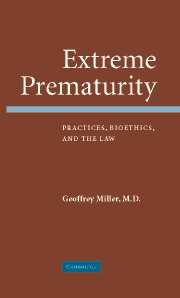Book contents
- Frontmatter
- Contents
- Part 1 THE EXTREMELY PRETERM INFANT: EPIDEMIOLOGY, PERCEPTIONS, AND PRACTICES
- 1 Introduction
- 2 Historical Aspects
- 3 Survival
- 4 Influence of Obstetric Management
- 5 Effect of Resuscitation in the Delivery Room
- 6 National Comparisons
- 7 Prediction of Outcome
- 8 Limit of Viability
- 9 Morbidity
- 10 School Age Outcome
- 11 Adolescence
- 12 Perceptions and Practices
- 13 Resource Expenditure
- Part 2 BIOETHICS
- Part 3 REPORTS, OFFICIAL OPINIONS, AND GUIDELINES
- Part 4 THE LAW
- Part 5 EPILOGUE: TRUTH, TRUST, AND BOUNDARIES
- References
- Index
7 - Prediction of Outcome
Published online by Cambridge University Press: 23 September 2009
- Frontmatter
- Contents
- Part 1 THE EXTREMELY PRETERM INFANT: EPIDEMIOLOGY, PERCEPTIONS, AND PRACTICES
- 1 Introduction
- 2 Historical Aspects
- 3 Survival
- 4 Influence of Obstetric Management
- 5 Effect of Resuscitation in the Delivery Room
- 6 National Comparisons
- 7 Prediction of Outcome
- 8 Limit of Viability
- 9 Morbidity
- 10 School Age Outcome
- 11 Adolescence
- 12 Perceptions and Practices
- 13 Resource Expenditure
- Part 2 BIOETHICS
- Part 3 REPORTS, OFFICIAL OPINIONS, AND GUIDELINES
- Part 4 THE LAW
- Part 5 EPILOGUE: TRUTH, TRUST, AND BOUNDARIES
- References
- Index
Summary
There can be substantial error rate when physicians estimate outcome for the EPTI.(60–63) Tyson and associates(30) reported error rates of 52% and 21% in the prediction of death and survival for infants weighing 501–800g at birth. Despite the requirement that physicians practice according to the best available evidence, this may not always be the case, and in such circumstances they may incorrectly estimate the chances of death and disability,(64) which affects their decisions as well as the counseling of parents.(44, 60)
In 2001, it was reported that at the University Medical Center in Leiden, a leading center for the the treatment of preterm infants in the Netherlands, a decision, in principle, was taken to stop active intensive treatment of babies born less than 25 weeks' gestation.(65) However, the head of neonatology at the center stated that, “infants born before 25 weeks would still be given ‘vigorous support’ if the parents wished and the medical team considered the infant viable at birth.”(65) The decision was made because, in their study of premature births from 1996 through 1997, 66% of those born at 23 and 24 weeks died, and half the survivors had severe physical or mental handicaps.(65)
- Type
- Chapter
- Information
- Extreme PrematurityPractices, Bioethics and the Law, pp. 23Publisher: Cambridge University PressPrint publication year: 2006



